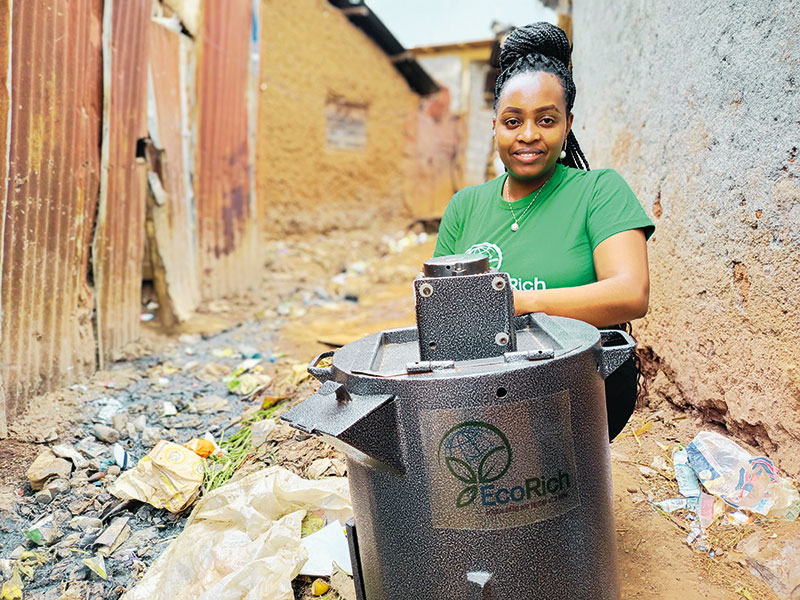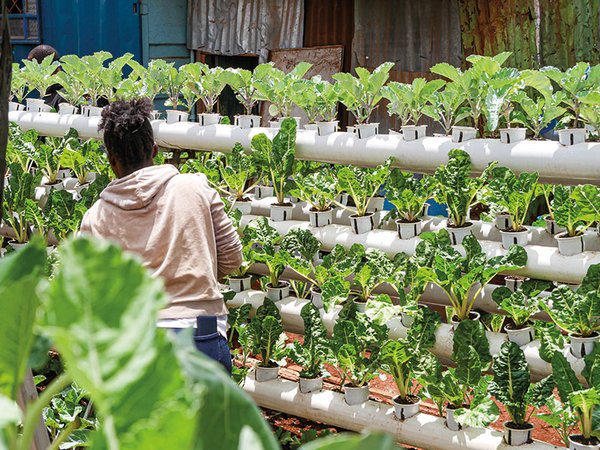 Download this article in magazine layout
Download this article in magazine layout
- Share this article
- Subscribe to our newsletter
Unleashing the power of innovation
The World Food Programme (WFP) has a presence in over 120 countries around the world to provide life-saving humanitarian assistance and build more resilient food systems. And yet, while up to 783 million people faced hunger in 2022, one-third of all food goes to waste. Food lost through poor farming, harvest and storage practices not only represents lost food security, nutrition and wasted resources but also lost opportunities to invest income in education, health and well-being. Imagine the potential impact of solutions should annual food loss – valued at 1 trillion US dollars – be reduced or eliminated and reinvested in achieving zero hunger and the Sustainable Development Goals (SDGs).
The WFP Innovation Accelerator
In 2015, the WFP Innovation Accelerator was launched to identify, support and scale innovations that can help make WFP’s emergency response more efficient and effective and disrupt hunger globally. It has since become the world’s largest social impact start-up accelerator, offering 15 acceleration programmes each year to address a wide range of global challenges, from hunger and climate change to primary healthcare, gender equality, and emergency response. In eight years, the WFP Innovation Accelerator has raised 200 million USD in co-funding with public and private entities and has designed its innovation programmes to accelerate social impact start-ups and companies. With its broad global network of Innovation Hubs and Units, the Innovation Accelerator serves a key role in connecting high-potential solutions to the resources and support necessary to reach greater impact for the most vulnerable communities.
In 2022 alone, the WFP Innovation Accelerator’s portfolio of 150+ innovations reached 37 million people globally.
At each stage of the food value chain, innovators are developing solutions to optimise food production, distribution, storage, consumption and disposal in diverse contexts to reduce and manage food waste. The WFP Innovation Accelerator (see Box), which sources, supports and scales high-impact innovations to disrupt hunger and achieve the SDGs, has empowered several innovative solutions focused on these challenges to deliver greater impact around the globe. Two examples are presented in the following.
Reducing post-harvest waste for producers – Smartel Agro
Around half of total food waste (14 per cent of all food) occurs between harvest and retail. This post-harvest waste arises from various sources in production and supply chain inefficiencies. The Nigeria-based start-up Smartel Agro empowers farmers to cultivate fresh produce in urban areas through a climate-smart hydroponic system powered by interconnected data and technology. To date, 70 farmers are using this technology on their farm. Smartel Agro’s unique model combines three tools to produce food more efficiently in urban-rural contexts:
Internet of Things. The utilisation of Internet of Things (IoT) allows for real-time monitoring and data-driven insights that enable precise control over environmental conditions, ensuring optimal plant growth and minimising the risk of spoilage. Smart irrigation efficiently manages resources, leading to a 90 per cent reduction in water usage compared to traditional farming methods. This not only addresses water scarcity concerns but also contributes to sustainable agriculture by mitigating the environmental impact of excessive water consumption.
Hydroponic farming. Hydroponic farming – farming without soil – contributes to a significant reduction in food loss. The portable and stackable design of the system allows for year-round cultivation, overcoming seasonal limitations and producing eight times higher yield than traditional farming. In the initial pilot, the Smartel team are exploring and planning to select three key crops to integrate into their hydroponic system based on their potential to positively impact farmers and improve food security. By cultivating crops in a controlled environment, the hydroponic technology ensures a consistent and abundant supply of fresh produce, while reducing the risk of pests and diseases. Additionally, the proximity of hydroponic systems to urban centres reduces the time and distance between harvest and consumption, further decreasing the likelihood of spoilage during transportation.
Support for smallholder farmers. Smartel Agro is committed to making its technology accessible to smallholder farmers, its main consumer base. The primary sources of revenue involve selling hydroponic systems and related services. The customers, who include both rural small-scale farmers and city dwellers, purchase the portable hydroponic setups for cultivation purposes. Additionally, the team offer consultation and installation services to assist clients in establishing and effectively managing their hydroponic systems. This service provision generates income through associated fees. Moreover, Smartel introduced a pay-as-you-go subscription plan designed specifically for rural farmers who might encounter difficulties with upfront payments. This approach guarantees accessibility for individuals unable to cover the initial investment by allowing them to make periodic payments while still benefiting from the technology and expertise.
Managing household organic waste for consumers and producers – EcoRich
Once food reaches consumers, there are still opportunities for food to go to waste or for food waste to be mismanaged, which causes a variety of long-term health and environmental risks. The Kenyan start-up EcoRich Solutions has taken a transformative step here through its innovative WasteBot technology. At the heart of its mission is the development of an Artificial Intelligence-powered waste decomposer device that, using soil-based microorganisms, not only rapidly converts harmful waste into organic fertiliser but does so at a fraction of the cost of conventional fertilisers. The team operate in two business models: 1) direct-to-consumers (D2C): selling organic fertiliser at 25 US dollars for each 50kg bag; b) renting out the decomposer machine to large-scale farmers. The farmers utilise it to recycle farm waste into organic fertiliser, which they then apply in their farms for a monthly fee of 2 US dollars.

EcoRich founder and CTO Joyce Waithira presenting their innovative food waste solution, the WasteBot. Photo: EcoRich
EcoRich’s WasteBot efficiently transforms up to 50 kilograms of organic waste into nutrient-rich organic fertiliser in just 24 hours, disrupting the traditional timeline associated with waste disposal. Moreover, it addresses the issue of farm losses by providing an affordable and effective solution for farmers. The WasteBot’s ability to turn waste into food also aligns with the broader goal of sustainable agriculture and climate change mitigation. The organic fertiliser, produced through AI-enabled recycling and robotics, reduces not only reliance on chemical fertilisers but also greenhouse gas emissions. It contains essential nutrients that improve soil quality, supplement nutritional requirements of the plants and enhance their ability to absorb nutrients optimally. The decomposer device is able to assess nutrient levels in the fertiliser, encompassing both macro and micronutrients. All this not only ensures food security for farming families but creates opportunities for surplus produce to enter the market as well, addressing broader issues of food shortages.
By producing organic fertiliser that is 70 per cent cheaper than normal fertilisers, the company has significantly expanded its reach. This affordability factor has resulted in a remarkable increase in the number of farmers who can now access and afford their fertiliser – EcoRich has reached 3,150 farmers in Kenya, who have reported a 36 per cent increase in yields and a 25 per cent income rise after switching to the organic fertiliser.
EcoRich’s WasteBot technology is a holistic, affordable solution to food loss and waste. By seamlessly transforming household waste into a valuable resource for agriculture, the start-up is reducing the environmental impact of food waste and farming, improving sustainable farming practices, increasing farm production and supporting the overall well-being of farming communities.
Using innovation to end food waste and hunger
The amount of food that goes to waste each year could feed the world’s population facing hunger four times over if the challenges that cause food waste are addressed more rigourously. The potential impact which innovation can have here should not be underestimated. In fact, innovators are uniquely positioned to forge new paths to zero waste and implement and scale solutions which, ultimately, contribute to the mission goal of zero hunger. With innovation, producers can optimise their resource usage and production chains, resulting in healthier, more resilient produce arriving at the market closer to the day of harvest and reducing spoilage. With longer-lasting produce, consumers are afforded more time to cook and create healthy meals, reducing their at-home waste. In addition, proper management of existing food waste can alleviate negative environmental impacts and produce fertiliser to improve farm production in turn.
At the World Food Programme Innovation Accelerator, we seek to enable innovations, like Smartel Agro and EcoRich, to reach new heights in their scaling and impact. Without innovation, the global food system will continue in its cycle of wasting one-third of the food it produces, with ongoing negative impacts in the context of a global hunger crisis. In order to break the cycle, we all should look to innovators for impactful solutions to the many food loss and waste challenges we face.
The two ventures are part of the Agricultural Innovation for Climate Resilience Programme (AICR), a partnership between the WFP Innovation Accelerator and the Deutsche Gesellschaft für Internationale Zusammenarbeit GmbH (GIZ) and its Fund for the Promotion of Innovation in Agriculture (i4Ag), commissioned by the German Federal Ministry for Economic Cooperation and Development (BMZ). The programme enables scalable innovative solutions that support farmers and other agriculture stakeholders to build capabilities to mitigate the effects of climate change on low- and middle-income countries (LMICs).
Nourdine Khalifeh is a new ventures consultant at the World Food Programme Innovation Accelerator, where he sources innovations that support progress on the SDGs. He has eight years of experience in business consulting and early-stage venture development.
Jackie Negro is a communications consultant at the WFP Innovation Accelerator, where she supports content development for the Accelerator, with a focus on nutrition and climate change. She has a background in food systems communications in the non-profit sector.
Contact: jackie.negro@wfp.org
References
SOFI 2023
#StopTheWaste 2021 | World Food Programme (wfp.org)




